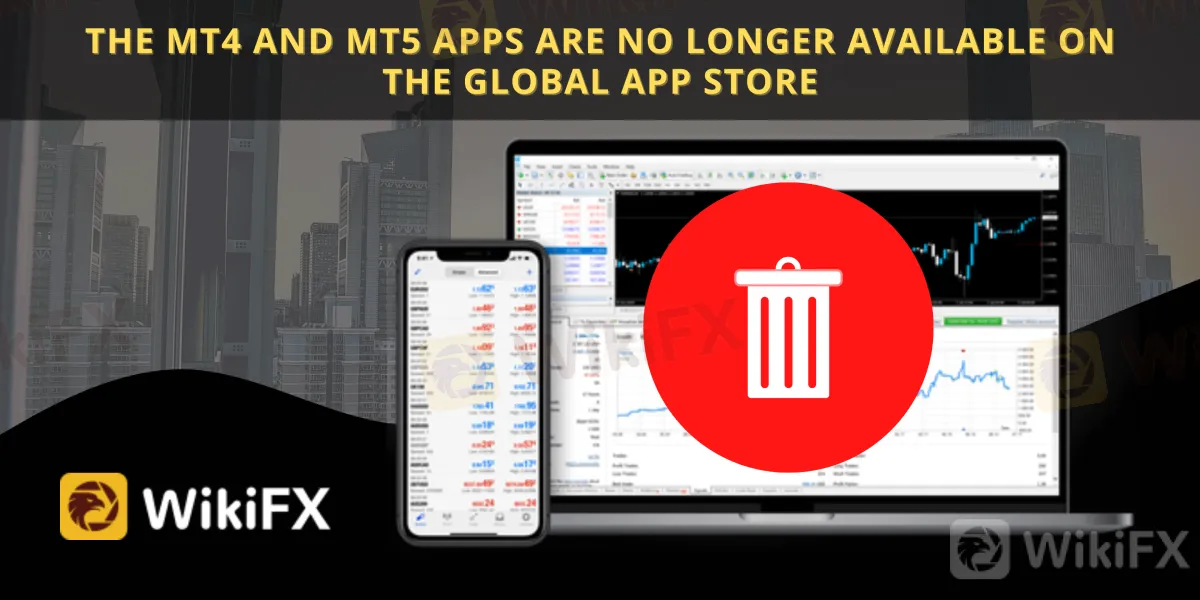简体中文
繁體中文
English
Pусский
日本語
ภาษาไทย
Tiếng Việt
Bahasa Indonesia
Español
हिन्दी
Filippiiniläinen
Français
Deutsch
Português
Türkçe
한국어
العربية
The MT4 And MT5 Apps Are No Longer Available On The Global App Store
Abstract:Apple has been removed MT4 and MT5 from their Global App Store. Read the full article below

According to reports, the suspension of popular trading applications is related to Western sanctions against Russia.
Apple seems to have removed popular trading programs MetaTrader 4 and MetaTrader 4, commonly known as MT4 and MT5, from the App Store overnight, a decision that might be related to Western sanctions imposed in response to Russia's invasion of Ukraine.
Neither Apple nor MetaQuotes have responded publicly to the removal.
As of Saturday at 9 p.m. AEST, both apps were accessible on Google Play, the counterpart for Android phones. The PC versions are likewise unaffected for the time being.
MetaQuotes Software Corp., a Russian software business with an offshore registration in Limassol, Cyprus, offers app versions of major PC electronic trading platforms.
Except for CEO Renat Fatkhullin, who has traditionally maintained a low profile, there is no publicly available information concerning MetaQuotes' beneficial owners.

Following Russia's Feb. 24 invasion of Ukraine, the US and its allies, mainly the EU, placed a slew of sanctions on Moscow, including restrictions on its central bank, key lenders, oligarchs, corporate leaders, and Russian President Vladimir Putin.
Visa and Mastercard's activities in Russia have been halted, and bank transfers and financial transactions have been prohibited.
Mir, the Russian payment system that was only supported by a few nations outside of Russia, was also dealt a significant blow this week when banks in Turkey and Central Asia suspended it after the U.S.
The Treasury Department warned financial institutions that maintaining commercial relationships with sanctioned Russian persons or firms, or any entity associated with them, would result in fines.
In March, Apple ceased all product sales in Russia and discontinued financial services, including Apple Pay.
In Russia, MT4 was introduced in 2005, followed by MT5 in 2009, which supported additional trading instruments. According to September 2019 research, MetaTrader 4 was still the most used trading platform in the world.
Stay tuned for more Forex news.
Download the WikiFX App from the App Store or Google Play Store.

Disclaimer:
The views in this article only represent the author's personal views, and do not constitute investment advice on this platform. This platform does not guarantee the accuracy, completeness and timeliness of the information in the article, and will not be liable for any loss caused by the use of or reliance on the information in the article.
Read more

Investing Capital in Focus as Complaints on Withdrawal and Other Issues Mount
Explore this guide we have exposed Investing Capital, which has mounted concerns for traders by disallowing withdrawals and making them lose their hard-earned money.

4 Warning Signs That Indicate You May Get Scammed in Your Forex Investments
In this blog, we will share with you a guide telling you about the tactics fraudsters employ to dupe investors.

Global Brokers Vs. Indian Rules: Why They Struggle in India
RBI issued a warning last year against 75 forex brokers. Those brokers are globally popular and regulated in other countries, but they are banned in India. Only few brokers even have physical offices located in India. So, why do global brokers face so many challenges in entering the Indian market?

Aetos: A Closer Look at Its Licenses
With multiple regulatory entries and one license now revoked, Aetos stands as a broker requiring closer scrutiny from investors, particularly those prioritizing license scope and jurisdictional compliance.
WikiFX Broker
Latest News
Tokenized Stocks: Innovation or Just Another Wrapper?
Gold Rush Again: What's Driving the Bullion Market Crazy Ahead of US Jobs Data?
XTB Launches Tax-Advantaged Retirement Accounts in Poland
Zaffex Broker Review
ECB Ends Easing Cycle, But The Eurozone Crisis Is Just Beginning
Amazon deploys its 1 millionth robot in a sign of more job automation
MT4 and MT5 Platforms - Helping Traders Up Their Forex Trading Game
A bare-bones deal is Europe's best hope in trade talks with the U.S., sources say
10-year Treasury yield remains higher despite weak ADP jobs report
Blueberry Markets Revamps its Website
Currency Calculator


